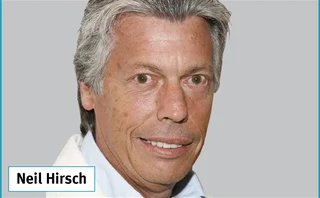Obituary: Telerate founder Neil Hirsch dies at age 74
Former employees praise the kind and caring CEO who made millions from data but still knew staff by name.

Long before Michael Bloomberg launched his eponymous data business with his Salomon Brothers payout, another data vendor dominated the fixed-income data industry: Telerate, founded by Neil Hirsch, a college dropout who spotted a huge opportunity to provide fixed-income data via electronic terminals.
Hirsch, who died last week at the age of 74, pioneered the growth of electronic data terminals, founding Telerate in 1969, and striking exclusive bond pricing licenses—most notably with Cantor Fitzgerald, which took a 25% stake in the vendor—that sent its value soaring.
The company’s fortunes created a culture of excess—lavish parties, lucrative rewards for employees, and a “license to print money,” as Hirsch would boast to friends.
He made more money than he could spend, so he didn’t even try. Instead, he “shared the wealth,” and gave all employees stock options out of his own pocket. He didn’t throw tantrums if revenue was flat for a quarter, and he had a philosophical reaction to the “Black Monday” market crash of 1987—“So I was worth $250 million yesterday, now I’m worth $125 million today,” says Larry Kinsella, who served as CFO at Telerate before and after its acquisition by Dow Jones. “He wasn’t a greedy guy. Everyone loved Neil. It was a great place to work.”
Victor Peeke, who worked for the company from 1988 to 1994 as a sales manager for its energy data product, describes Telerate as “full of characters, reprobates and rogues,” but says the friendships forged during that period have lasted into his retirement.
“The biggest mistake I ever made was not to join them in New York in the early 80s when futures screens became de rigueur. I worked at Platts in New York then, and like the Platts editors, didn’t believe it would work, so I declined to join them…. Big mistake. Futures screens took off like hot cakes,” Peeke says. “It was great—great being told ‘Peeke, get in here! What are you doing? You have £6,000 a month expenses. You’re only spending £3,000. Get out there and spend it! ALL of it or it’ll be taken away.’ So I spent it,” he adds, recalling a lavish £750 client lunch the following day.
But the company also created a culture of sharing its wealth and going the extra mile to support and make employees feel valued.

Petrina Trimlett, now an independent consultant, worked at Telerate in the 1980s. It was her second job out of college, and it left a lasting impression of how companies should work and what makes a good CEO.
“I thought all company CEOs walked the floors to interact with people, paid for lunches if you worked at your desk, held elaborate Christmas parties at the best places, and organized company picnics. Neil would also personally sign all the company ID cards to better know new hires as well,” Trimlett says.
Hirsch also personally hired executives where he spotted an opportunity to expand or improve the business, making snap decisions that would prove masterful. Peter Jaeger was working as an interpreter for a reporter from Japanese economic newspaper Nihon Keizai Shimbun when he first met Hirsch in 1986 at Telerate’s office in One World Trade Center in New York. He marveled at the large office with a classical wooden desk, leather blotter, and bank of computer monitors, the view from the 105th floor, and the original Rodin sculptures that punctuated the space.
“The reporter asked all the usual questions in Japanese. I translated and Hirsch answered with ennui in his tone and facial expression,” Jaeger says. But then something occurred to Hirsch and his mood became focused and intense. To expand globally, Telerate had engaged local news services as distributors—for example, Kyodo News in Japan. However, because the idea of real-time trading screens or bond prices was new, some distributors struggled to sell enough terminals to satisfy Hirsch, who believed the Japanese market for Telerate should be “absolutely immense,” Jaeger says. Hirsch recognized there was a “deep cultural gap” between the hungry Telerate and the “staid and venerable” Kyodo News—and in Jaeger he saw an opportunity to bridge that gap and boost sales in Japan.
“As I translated the reporter’s next question, Hirsch’s eyes burned into mine. He wasn’t listening and I lost my concentration. Hirsch pressed a button on his desk and in seconds a tall, handsome middle-aged man rushed in. Hirsch pointed to me and said ‘Hire him!’”
The reporter remained blissfully unaware as Jaeger respectfully declined the offer. But Hirsch wasn’t the kind of person to take “no” for an answer. “We’ll call you,” he said. By September, Jaeger had joined the company, and in January 1987 moved to Tokyo as the Telerate New York ambassador to Kyodo News.
Hirsch also remained involved in the nitty-gritty details of Telerate’s day-to-day business issues. For example, after Trimlett left the company and was working for a large bank, Hirsch personally called her to help resolve some unpaid Telerate invoices.
Hirsch’s influence and culture remained at Telerate, even after he left the company following its 1990 sale to Dow Jones.
Melanie Wold, a former editor of Trading Technology Week and Inside Market Data (part of WatersTechnology), who worked at Dow Jones Telerate between 1990 and 1997, describes an early experience at the company: It was her first week at Dow Jones Telerate in London as an editor on its energy products, and she had an appointment to meet a small oil company in Barnes, Middlesex. The trip would have been prohibitively time-consuming on public transport. She asked her manager if she could take a taxi. Talk to the managing director’s assistant, her manager said. The assistant arranged for Wold to use the managing director’s company car and driver.
“The next morning, a beautiful, new cherry-red Jaguar pulled up in front of Winchmore House, took me to Barnes for lunch, waited for me, and drove me back to the office,” says Wold, now a senior manager at Software AG. “I realized then that Telerate was one very classy company.”
But without Hirsch, and under indifferent ownership, the Telerate brand didn’t last. While some liked Telerate, its enthusiasm, and its new ways of doing business, others couldn’t accept its flamboyant culture and the paychecks—often higher than their new managers at Dow Jones—leading to a “boardroom uprising” and pressure to get rid of Telerate as Bloomberg gained ground in the terminal market while Dow Jones , Kinsella says. “Dow Jones didn’t quite know what to do with Telerate. They had this tiger by the tail, and if only they’d realized that they needed to back away from focusing so much on the [Wall Street Journal] newspaper and spend money in order to make money,” he says.
Dow Jones sold Telerate to Bridge Information Systems, which imploded in 2000 and was divided between Reuters, SunGard, and Moneyline, which acquired the branding and became Moneyline Telerate, ultimately dropping the Moneyline brand altogether. But the business continued to falter, and what remained was eventually snapped up by Reuters at the start of 2005.
Hirsch, meanwhile, remained an active entrepreneur, founding Loanet, which he sold to SunGard. After that, he pursued his love of polo, co-founding the Bridgehampton Polo Club and as owner of the Black Watch Polo Team. He also founded the Neil S. Hirsch Family Boys and Girls Club in Wellington, Florida, where he lived.
Hirsch was much more than just a millionaire CEO, but—as many former Telerate staff have responded since learning of his passing—was a kind, generous, and approachable employer who cared deeply about his employees. According to former employees, he didn’t just care about their contribution to the company’s bottom line; he wanted to foster an environment where staff enjoyed working and were willing to go the extra mile because of how well they were treated by the company and by Hirsch in particular.
“It wasn’t until I left the company and worked for a bank managing market data that I realized how big a deal Telerate was and … that other companies did not have the [same] company culture and working environment,” Trimlett adds. “Neil had such a generous heart, it was because of him ‘The Telerate Oldtimers’ have such strong bonds to this day. He truly cared about the people that worked for him. He also had a great sense of humor. So many have commented after his passing that working for Telerate was the best job they ever had, and it was because of Neil Hirsch.”
Hirsch was one of the original inductees into the Inside Market Data Hall of Fame. Read the profile of Hirsch and the other original inductees here.
Only users who have a paid subscription or are part of a corporate subscription are able to print or copy content.
To access these options, along with all other subscription benefits, please contact info@waterstechnology.com or view our subscription options here: http://subscriptions.waterstechnology.com/subscribe
You are currently unable to print this content. Please contact info@waterstechnology.com to find out more.
You are currently unable to copy this content. Please contact info@waterstechnology.com to find out more.
Copyright Infopro Digital Limited. All rights reserved.
As outlined in our terms and conditions, https://www.infopro-digital.com/terms-and-conditions/subscriptions/ (point 2.4), printing is limited to a single copy.
If you would like to purchase additional rights please email info@waterstechnology.com
Copyright Infopro Digital Limited. All rights reserved.
You may share this content using our article tools. As outlined in our terms and conditions, https://www.infopro-digital.com/terms-and-conditions/subscriptions/ (clause 2.4), an Authorised User may only make one copy of the materials for their own personal use. You must also comply with the restrictions in clause 2.5.
If you would like to purchase additional rights please email info@waterstechnology.com
More on Data Management
Stocks are sinking again. Are traders better prepared this time?
The IMD Wrap: The economic indicators aren’t good. But almost two decades after the credit crunch and financial crisis, the data and tools that will allow us to spot potential catastrophes are more accurate and widely available.
In data expansion plans, TMX Datalinx eyes AI for private data
After buying Wall Street Horizon in 2022, the Canadian exchange group’s data arm is looking to apply a similar playbook to other niche data areas, starting with private assets.
Saugata Saha pilots S&P’s way through data interoperability, AI
Saha, who was named president of S&P Global Market Intelligence last year, details how the company is looking at enterprise data and the success of its early investments in AI.
Data partnerships, outsourced trading, developer wins, Studio Ghibli, and more
The Waters Cooler: CME and Google Cloud reach second base, Visible Alpha settles in at S&P, and another overnight trading venue is approved in this week’s news round-up.
A new data analytics studio born from a large asset manager hits the market
Amundi Asset Management’s tech arm is commercializing a tool that has 500 users at the buy-side firm.
One year on, S&P makes Visible Alpha more visible
The data giant says its acquisition of Visible Alpha last May is enabling it to bring the smaller vendor’s data to a range of new audiences.
Accelerated clearing and settlement, private markets, the future of LSEG’s AIM market, and more
The Waters Cooler: Fitch touts AWS AI for developer productivity, Nasdaq expands tech deal with South American exchanges, National Australia Bank enlists TransFicc, and more in this week’s news roundup.
‘Barcodes’ for market data and how they’ll revolutionize contract compliance
The IMD Wrap: Several recent initiatives could ease arduous data audit and reporting processes. But they need buy-in from all parties if all parties are to benefit.








